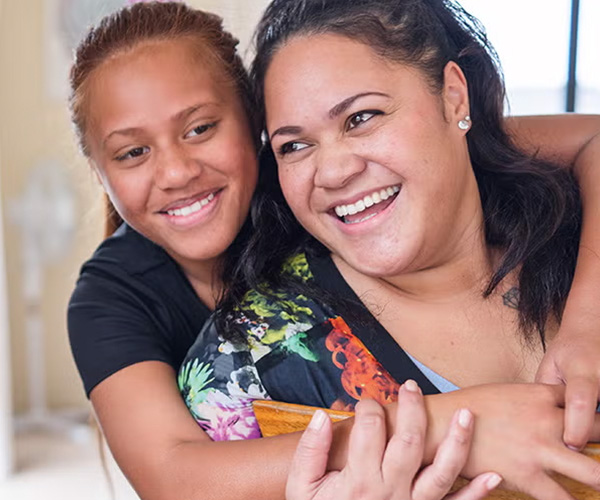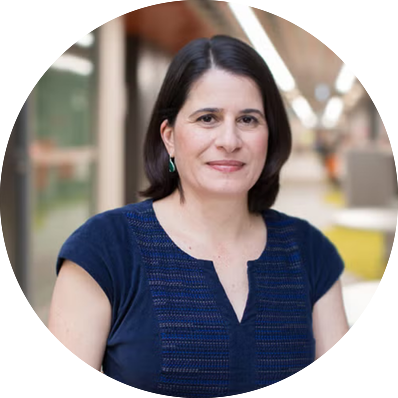Why study the Master of Women’s and Children’s Health with UTS Online?
Top 100 University Globally1
Lead the way in women’s and children’s health with the first degree of its kind
Deliver impact where it matters most with 3 in-demand majors to choose from
Study an industry-led curriculum that’s designed to meet the industry needs of the future
1QS World University Rankings, 2026.
Woman and children in focus
44% of women in Australia cannot afford to see a doctor when they need it. This number increases to 70% for women from non-English speaking backgrounds, 62% for women with a disability, 53% for Aboriginal and Torres Strait Islanders and 57% for LGBTQI+ identified.1 While those in rural or remote areas are disadvantaged by distance and limited access to quality care.
Who you are, or where you come from should not determine your health. The time for change in women’s health is now.
The UTS Online Master of Women’s and Children’s Health is the first degree of its kind. This course focuses on the unique and individual needs of women and children including reproductive health, pregnancy, motherhood and menopause, while giving you the knowledge and skills to deliver high-quality, culturally safe and accessible care to all Australians.
A healthy future depends on the health of women and children.
1Jean Hailes

Who is this course for?
The UTS Online Master of Women’s and Children’s Health is for midwives, nurses and allied health professionals (which may include Physiotherapists, Occupational Therapists, Social Workers, Speech Pathologists, Dietitians, Psychologists, and Naturopaths) looking to:
- Take advantage of an in-demand career in women’s and children’s health
- Have a positive influence on the current state of women’s and children’s health through evidence-based policy and further research
- Transform the future of women’s and children’s health and progress their career with the first degree of its kind
- Build the confidence to progress into a leadership role
- Follow their passion into a fulfilling career that delivers focused care to women and children, from adolescence to motherhood and in the workforce
See entry requirements under course information for eligibility information.
What you will study
The UTS Online Master of Women's and Children’s Health comprises 13-15* online subjects (72 credit points (CP) in total).
*The number of subjects completed may vary depending on the credit point (CP) value of the subjects elected.
Complete the following seven subjects:
- Contemporary Women's Health Issues
- Global Perspectives on Sexual and Reproductive Health and Rights
- The Child in the Contemporary World
- Legal and Ethical Issues in Women's Health
- Leading Health and Social Care
- Indigenous Public Health
- Foundations in Public Health
Note: Most UTS Online subjects are valued at 6 credit points each. For detailed subject descriptions and further information, please download a course guide.
Choose your own study path
Select from one of the below major options to suit your career aspirations OR design your own pathway.
Develop the fundamental skills required in research practices to provide evidence-based theories on how socioeconomic status, gender, political and social support, and country of residence impact women’s sexual, reproductive and lifelong health — using your findings to develop and guide future research or policy.
Build confidence through evidence, understanding, collaboration and the vision to deliver equitable care focused on women and children. Learn to successfully manage people and processes in a health service organisation, driving positive change in women's and children's health.
Develop specialised skills in reproductive and sexual health, using your comprehensive understanding of fertility and fertility pathways to educate and support people on their fertility journey.
Flexible course options
The Master of Women’s and Children’s Health comprises 13 - 15 subjects* (72 credit points [CP] in total).
Students who complete 4 core subjects (24 CP) from the Master of Women’s and Children’s Health may be eligible to exit with a Graduate Certificate in Women's and Children’s Health.
Students who complete 8 core subjects (48 CP) from the Master of Women’s and Children’s Health may be eligible to exit with a Graduate Diploma in Women's and Children’s Health.
*The number of subjects completed may vary depending on the credit point (CP) value of the subjects elected.
Graduate Certificate
4 Subjects | 8 months
Or continue studying
Master
+9* Subjects | 24 months
Graduate with a Master's degree
For more information, download your course guide or speak to a Student Enrolment Advisor.
Learning outcomes
Philosophy and practice that focuses on the individual needs of women and children
Understand that politics, gender, history and tradition all influence the current state of women’s health. Reflect on this to develop a philosophy and practice that puts women and children in focus. Enhance your ability to recognise the influence of gender, how it intersects with other dimensions of diversity, and the impact on equitable access to services and personal wellbeing.
Evidence-informed and reflective practice
Learn how to reflect on your practice, guided by informed judgements based on research, open-mindedness, and a responsive and inclusive attitude. Critique existing policies and strategies that promote social justice and advocate for further research in reproductive, sexual and women’s health.
An ethical and collaborative approach
Women of all cultures have diverse needs and expectations, and not all are afforded the same quality of healthcare. In this course you’ll develop the knowledge and skills to meet the unique and individual needs of women and children. Apply your understanding of social and cultural diversity, informed by an ethical and collaborative approach.
Contemporary, strengths-focused leadership
Build the strength, confidence and vision to drive change in women’s and children’s health. Explore strengths-based and future-focused leadership approaches for all areas of practice and healthcare settings, and learn how to model evidence-based practice and respectful care.
Course information
Entry requirements
Applicants must have one of the following:
- Completion of an Australian bachelor’s degree or higher qualification, or overseas equivalent, in Nursing, Midwifery, Public Health, Rehabilitation Therapies, or another recognised health discipline
OR
- Completion of an Australian bachelor’s degree or higher qualification, or overseas equivalent, in any field of study, and a minimum of two years’ full-time (or equivalent part-time) relevant professional work experience in an allied health profession, such as social work, public health practice, occupational therapy, psychology, physiotherapy, speech pathology, dietetics, or nutrition
Applicants who do not meet the above criteria should consider applying for a Graduate Certificate in Women's and Children's Health.
Supporting documentation to be submitted with the application
For applicants who need to demonstrate professional work experience:
- Curriculum Vitae
- Evidence of current professional registration (where applicable), such as registration with the Nursing and Midwifery Board of Australia (NMBA) or the relevant professional body in the applicant’s home country
Eligibility for admission does not guarantee offer of a place.
Want to check your eligibility?
Not only do we have the right tools and support teams to help you – we have people who care about your success.
Career outcomes
The UTS Online Master of Women and Children’s Health equips healthcare professionals with the advanced skills and knowledge to provide specialised care, improve outcomes and advocate for women and children in diverse healthcare settings. This course prepares you to lead with confidence in this vital area of healthcare.
Upon completion, graduates can explore roles such as:
- Senior Policy Officer
- Policy Advisor
- Midwife or Nurse Unit Manager
- Midwifery or Nursing Educator
- Midwifery or Nursing Researcher
- IVF Midwife or Nurse
- Sexual Health RN/RM Coordinator
- Progression into further research
$84,000 Average Salary
Child and Family Health Nurses in Australia earn an average annual salary of $84,000, showcasing the financial benefits of this specialised nursing field.
(Talent)
26%
Growth in nursing and midwifery workforce
The nursing and midwifery workforce in Australia grew by 26% between 2013 and 2022, reflecting rising demand in women’s and children’s health.
(AIHW)
15%
of Australia's workforce in health care and social assistance
Health Care and Social Assistance employs 15% of Australia’s workforce, highlighting its critical role in the national employment landscape.
(Australian Bureau of Statistics)
Upcoming intakes
UTS Online courses have 6 intakes per year. The diagram below shows all upcoming intakes. Our next intake is highlighted below.
-
Jan
2026 -
Mar
2026 -
May
2026 -
Jun
2026 -
Aug
2026 -
Oct
2026
Meet our Course Director
“The Master of Women's and Children’s Health is a deep dive into the social, political and structural landscape of contemporary health issues facing women and children. The tailored streams equip graduates with in-demand knowledge, skills and perspectives to enable them to have a positive impact on the lives of women and children.”
Dr Vanessa Scarf
Associate Professor Vanessa Scarf, Director of Postgraduate Midwifery Studies
Download a course guide
Download a course guide to explore detailed subject descriptions, entry requirements, pathway options and fee information.
Frequently asked questions
The Master of Women’s and Children’s Health is designed to help midwives, nurses, and allied health professionals upskill, transition into a high-demand area of practice, and gain specialist skills in women’s and children’s health. With this qualification, you can progress into senior roles, equipped with strengths-based and future-focused leadership skills developed with industry professionals.
No, the Master of Women’s and Children’s Health is a 100% online course, offering the flexibility and support needed for working professionals to complete their studies while maintaining their careers. For those seeking a family-centred clinical placement, the Graduate Certificate in Child and Family Health provides this experience and can serve as a pathway into the master’s program.
The Master of Women’s and Children’s Health at UTS Online prepares graduates for diverse roles tailored to their professional background:
-
For midwives: This course can prepare you for roles such as Midwifery Unit Manager, Midwifery Educator, Midwifery Researcher, IVF Midwife, or Policy Advisor.
-
For nurses: You may advance into roles such as Nurse Unit Manager, Nursing Educator, Nursing Researcher, IVF Nurse, or Policy Advisor.
-
For allied health professionals: This course enhances your practice in working with women and children within your field and opens opportunities for leadership or policy-focused roles.
Assignments in our subjects are authentic, relevant and often grounded in your personal clinical context. They vary according to the subject and include, but are not limited to clinical reports, posters, online quizzes and vivas (oral assessment), podcasts, recorded presentations, education tools, proposals, protocols and professional portfolios. You will not be required to complete exams or group assignments to graduate the Master of Women’s and Children’s Health.
When you enrol in the Master of Women’s and Children’s Health at UTS Online, you’ll gain access to a user-friendly online platform tailored for healthcare professionals. Highlights include:
-
Flexible schedules to balance study with your clinical responsibilities
-
Interactive tools and resources focused on women’s and children’s health
-
Peer forums and video tutorials to support your learning journey
Here’s a video example showcasing key features of our online learning platform, including tools designed to enhance your study experience.
For practical tips on balancing your studies with work and life, click here to learn how to achieve your goals. Remember, our team is just an email or call away to support you every step of the way.







